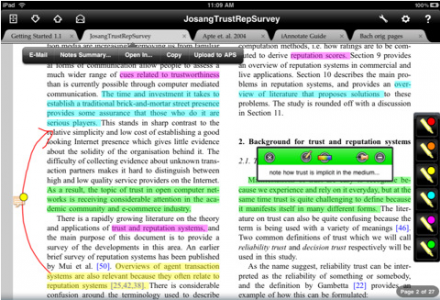Ready for an E-Reader? iAnnotate Restores a Reader's "Touch"...

The potential appeal of e-readers to researchers is obvious: in substituting one slim electronic device for hundreds, even thousands, of hardcover books and lengthy journal articles, they promise to allow researchers to carry their entire library with them while traveling. But many researchers have failed to embrace this technology, citing the poor selection of academic texts available in e-book format, and the awkwardness of annotating texts, as the primary reasons for their resistance. Even if more titles were to become available, reading, some say, is a tactile as well as a cognitive process, and highlighting and underlining are, for many, an integral part of the reading experience.
A new application for the Apple iPad aims to address this second problem. The application, iAnnotate, which costs $10 to download, allows readers to use their fingers to directly highlight, underline, scrawl comments, and circle text in pdf documents such as journal articles. Because the iPad uses a touchscreen, the “tactile” relation to the text is thus able to be transferred to the digital format. iAnnotate can also be used to sign documents - for example, letters of recommendation requiring a signature – and annotated documents can be emailed from within the application or easily transferred to a computer or other device.
So far iAnnotate works only with pdf documents. And unfortunately, the native iPad reading application – iBook – does not yet support annotations (it does allow bookmarks). So while iAnnotate may promise to transform the iPad into a paper-saving archive of digital journal articles that can be marked up more or less like a hard copy, the iPad still lacks this functionality when it comes to books. Given this limitation, and the dearth of academic titles currently available in e-book format, it remains to be seen whether academics will widely embrace e-readers in the near future. What do you think?